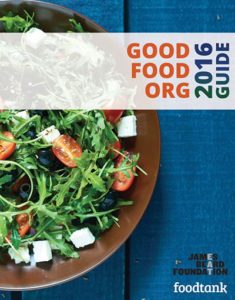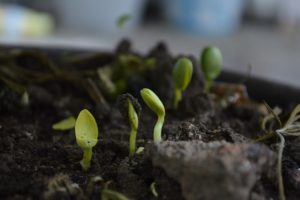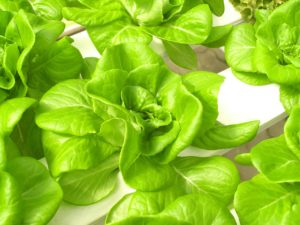Food Tank’s Summit Inspires Solutions For Foodies Everywhere
Many diverse groups of people from both public and private sectors attended the Food Tank conference in Chicago almost two weeks ago. There were three main panel discussions; including transparency in the food system (YES!) and the future of food and farming (double yes). If you are someone fighting for Food Justice then you would have loved to curl up with a cup of tea and your favorite snack because ALL DAY the conference took place LIVE Streaming on YouTube, Facebook and Twitter. If you missed it, you can still access clips on YouTube! Also, Food Tank just recently published a list of 20 Organizations Fighting for Food Justice as well as 7 Tips to A Food Waste Free Thanksgiving, which is applicable to any holiday or event, so check it out!
The Soil Sits it Out in Hollywood Still
 Last week, NY Times brought some attention to a fairly publicized irony that the Rockefeller group is not only generously striving for the remediation of environmental devastation through philanthropic work, but is, considered by many, mainly responsible for the denial of it. Specifically, referring to the fact that their initial (not to mention highly successful) capitalist scheme was fossil fuel and gas, or more precisely, now Exxon Mobil. The controversy about when and for how long the company was funding climate denial research is, at this point irrelevant, because the publicity of it all is making more difficult for Big Money to operate behind closed doors.
Last week, NY Times brought some attention to a fairly publicized irony that the Rockefeller group is not only generously striving for the remediation of environmental devastation through philanthropic work, but is, considered by many, mainly responsible for the denial of it. Specifically, referring to the fact that their initial (not to mention highly successful) capitalist scheme was fossil fuel and gas, or more precisely, now Exxon Mobil. The controversy about when and for how long the company was funding climate denial research is, at this point irrelevant, because the publicity of it all is making more difficult for Big Money to operate behind closed doors.
Important notes on the recent release of Leonardo DiCaprio’s new-hit documentary film, Before the Flood, points towards the mainstream still not getting it… “Too few people know that Monsanto and industrial agriculture are contributing more to climate change than Exxon, Chevron and the entire transportation industry combined,” says John W. Roulac, founder and CEO of the superfoods company, Nutiva. Apparently, though the film was applauded by many, including the NY Times, it seems there is some controversy about priorities when handling the gripping ordeal of climate change.
In recent news, the National Organic Standards Board (NOB) plans to decide whether hydroponically grown foods, a water-based model of cultivation, can be sold under the label “certified organic.” For many in the agricultural and food industry, this is a tense and controversial topic. Last year, Civil Eats vehemently agreed with many farmers and public interest groups who outwardly opposed changes to the standards for labeling organic, suggesting that ‘without soil there’s nothing organic in it to certify’.
Writer for the NY Times, Stephanie Strom, points out the view from either side of the greenhouse, including many people’s consideration of whether the hydroponic/aquaponic system is more or less economically viable and ecologically sound. Of course, there are trade-offs when planting vertically (less space, more energy?) as there are when planting on land (less soil, more water), but who shall ultimately decide the new standard??? Will it be the milieu entrepreneurs pouring money into these alternate systems, or is it our farmer elders who’ve been tilling their nutrient-rich soil for generations?
 For now, the NOB has voted 10-4 that the decision be pushed back to the committee to allow hydroponic production be organic certified. Meanwhile some foods NOT grown in soil (instead are grown hydroponically) are already being labeled as organic. It seems public advocate groups, farmers, and frustrated consumers will continue to rally and protest that the ‘Organic Be Kept in the Soil’.
For now, the NOB has voted 10-4 that the decision be pushed back to the committee to allow hydroponic production be organic certified. Meanwhile some foods NOT grown in soil (instead are grown hydroponically) are already being labeled as organic. It seems public advocate groups, farmers, and frustrated consumers will continue to rally and protest that the ‘Organic Be Kept in the Soil’.


Comments are closed.